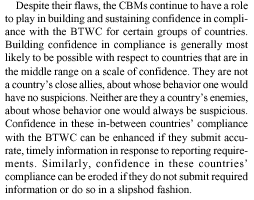
CBM = Confidence Building Measures, BTWC = Biological and Toxin Weapons Convention
"There is no mystery to voluntary disarmament. Countries that decide to disarm lead inspectors to weapons and production sites, answer questions before they are asked, state publicly and often the intention to disarm and urge their citizens to cooperate. The world knows from examples set by South Africa, Ukraine and Kazakhstan what it looks like when a government decides that it will cooperatively give up its weapons of mass destruction. The critical common elements of these efforts include a high-level political commitment to disarm, national initiatives to dismantle weapons programs, and full cooperation and transparency.
In 1989 South Africa made the strategic decision to dismantle its covert nuclear weapons program. It destroyed its arsenal of seven weapons and later submitted to rigorous verification by the International Atomic Energy Agency. Inspectors were given complete access to all nuclear facilities (operating and defunct) and the people who worked there. They were also presented with thousands of documents detailing, for example, the daily operation of uranium enrichment facilities as well as the construction and dismantling of specific weapons.
Ukraine and Kazakhstan demonstrated a similar pattern of cooperation when they decided to rid themselves of the nuclear weapons, intercontinental ballistic missiles and heavy bombers inherited from the Soviet Union. With significant assistance from the United States warmly accepted by both countries disarmament was orderly, open and fast. Nuclear warheads were returned to Russia. Missile silos and heavy bombers were destroyed or dismantled once in a ceremony attended by the American and Russian defense chiefs. In one instance, Kazakhstan revealed the existence of a ton of highly enriched uranium and asked the United States to remove it, lest it fall into the wrong hands. "
Source: "Why We Know Iraq is Lying" (cache) A column by Condoleezza Rice, US Presidential Security Advisor.
Dr. Tucker directed the Chemical and Biological Weapons Nonproliferation Program (CBWNP) at CNS and was based in the Center's Washington, D.C. office. Before joining the CNS staff in March 1996, he served with the Department of State, the congressional Office of Technology Assessment, the U.S. Arms Control and Disarmament Agency, and on the staff of the US Presidential Advisory Committee on Gulf War Veterans' Illnesses. In February 1995, he was a United Nations biological weapons inspector in Iraq.
"Today, both the CWC and the BWC are at delicate turning points that could lead either to a significant strengthening of the international norm against these heinous weapons or to the weakening of one or both treaties and an acceleration of chemical and biological weapons proliferation. The CWC entered into force on 29 April 1997 and more than 105 countries are now parties. Already, the CWC¹s inspectorate has sifted through masses of information contained in data declarations and conducted over 100 inspections. Practical experience being gained through the implementation of the CWC verification provisions should offer useful lessons for the negotiators crafting the BWC compliance protocol.More broadly, the fate of the chemical and biological disarmament regimes are linked. The emergence of serious problems with CWC implementation could discourage states from attempting to create a strong verification regime for the BWC. Conversely, successful implementation of the CWC would build confidence in the arms control process and give new impetus to the BWC protocol negotiations."
The Security Council, 27 January 2003: An Update On Inspection, Hans Blix,, Executive Chairman of UNMOVIC (in cache)
"While inspection is not built on the premise of confidence but may lead to confidence if it is successful, there must nevertheless be a measure of mutual confidence from the very beginning in running the operation of inspection.
....
Inspection .... is a process of verification for the purpose of creating confidence. It is not built upon the premise of trust. Rather, it is designed to lead to trust ..."
Confidence-building measures have been tried in the frame of the Biological Weapons Convention and Chemical Weapons Convention.
"Confidence-Building Measures for the Bioloical and Toxic Weapons Conventions: Performance and Potential" by Marie Isabelle Chevrier & Iris Hunger, The Nonproliferation Review/ Fall-Winter 2000.

|

|
"In the aftermath of the 1991 Persian Gulf War, the U.N. Security Council sought to ensure that a defeated Iraq would never again pose a threat to regional and international security. To this end, U.N. Security Council Resolution 687, which specified the conditions for the ceasefire, mandated the dismantling of Iraq's weapons of mass destruction (WMD) and ballistic missiles with a range exceeding 150 kilometers, together with the infrastructure needed to produce them. Stripping Iraq of its WMD is a key requirement for lifting the economic sanctions imposed on Baghdad in 1990 after the Iraqi invasion of Kuwait.To implement this program of enforced disarmament, the Security Council established the United Nations Special Commission on Iraq (UNSCOM), a multinational agency comprised of military, scientific, and technical experts. UNSCOM's task is to discover and destroy or render harmless Iraq's chemical, biological, and longrange missile capabilities and to assist the Viennabased International Atomic Energy Agency (IAEA) in eliminating Iraq's nuclear weapons program.
At the outset, it was expected that the host country would be noncooperative and perhaps even hostile. Indeed, over the past five years, Iraq has engaged in a systematic effort of misrepresentation, concealment, and deception aimed at impeding the ability of the U.N. agencies to carry out their disarmament mission. Although the "anytime, anywhere" inspection system in Iraq was imposed on the losing side in a war and thus is far more intrusive than any negotiated verification regime could be, future international inspectors are likely to face similar challenges when verifying compli ance with nonproliferation treaties.
It is therefore useful to reflect on the lessons of the U.N. experience in Iraq for monitoring and verification of the nuclear NonProliferation Treaty, the Chemical Weapons Convention, and the Biological Weapons Convention.